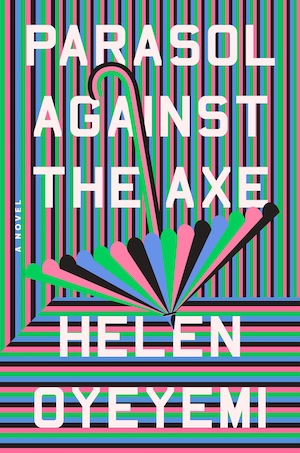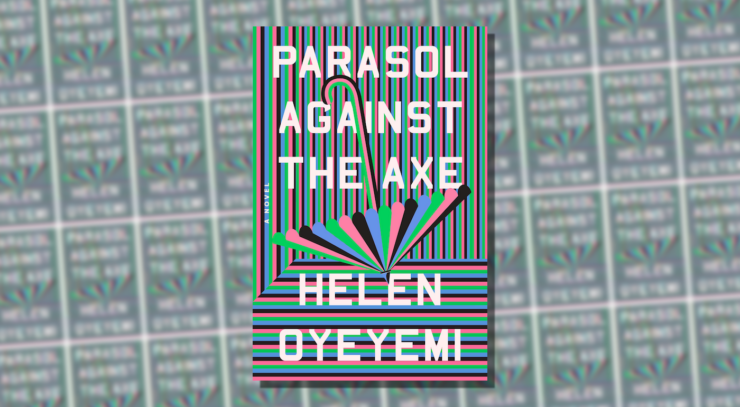It is a difficult thing to review a book that is, in large part, about the subjectivity of stories. Anything I tell you about Helen Oyeyemi’s Parasol Against the Axe will be only a fragment of what it actually is. Yes, this is the case with most of the author’s books—with most books, you could certainly argue!—but it is especially the case with this one, which resists categorization, labeling, certainty. It does not want to be pinned down. Like the city that tells part of the story, it might be impossible to fully know.
In her introduction to the review copy, Oyeyemi calls it a letter addressed to Prague—but Prague is also a character, or characters, and sometimes the narrator of this tale. Prague itself begins the book with a story about a WhatsApp thread entirely full of people bemoaning bad experiences in Prague. So what does the embodiment of Prague do? Replies in three languages, then deletes the app. “Mercurial” only begins to cover it.
In Oyeyemi’s telling, this is a city where any stroll might bring you face to face with something that goes well beyond the unexpected. A woman with a wheelbarrow offering to cart you home. A crowd of people yelling about their favorite clocks. A person in a mole costume (presumably this one) who makes you a deal, whether you want it or not. Time seems almost to collapse in on itself, or be irrelevant. It feels like a dream.
But it feels rude to say the book is like a dream, because Oyeyemi, as always, writes with a groundedness, a surety, that makes her every creation believable. (I still think about the house in White is for Witching, the factory in Gingerbread, the whole structure of Mr. Fox.) It is a speculative practicality I think she shares with Kelly Link; the fantastical, detailed worlds they create simply are this way, and the way they are written will show you how. In an interview with The Guardian, Oyeymi makes a different comparison:
“I felt almost at my limit with how much and how rapidly I was inventing, reeling off all this seemingly factual stuff with Borges-like conviction when it has no basis in actuality.”
Is it not actuality? Is it magic? Does it matter? Is it magic for a city to have a personality? For a book to be different to everyone who reads it?
Buy the Book


Parasol Against the Axe
There is a book, within Parasol Against the Axe, that offers a different story to everyone who reads it. Said book is one bit of connective tissue here. Another is Hero Tojosoa, who has come to the city for a bachelorette weekend that promises to be awkward in several ways at once. Is she really still friends with Sofie and Polly, who are getting married? What if she and Sofie’s mostly-ex-bestie Dorothea Gilmartin shows up? Thea said she wasn’t coming, but Hero is sure she saw her at the airport. (What are we to make of a character named Hero? A Shakespearean reference—a main character in Gingerbread was named Perdita—or a commentary on what this character is or isn’t?)
The women are in their early 40s, and they have history. So does Prague, and so does Paradoxical Undressing, the unpredictable book given to Hero by her teenage son. Everyone Hero talks to, it turns out, has read the book, but none of them have read the same book. To most readers, it’s full of Prague stories. One is about a bookstore, another about a judge, another about a quartet of taxi dancers. Each story-within-a-story reveals a new side of the city, a new era, a new framework of conflict, power, survival—and subjectivity.
Thea is given the book by the person in the mole costume, and she reads the story of the taxi dancers. This version of Paradoxical Undressing particularly stuck with me for a bit about a locked box the dancers open with a hairpin after its previous owner tried and failed to blow it up. (Different approaches, wildly different outcomes.) A story about a hair thief specifically illustrates one of Oyeyemi’s themes: how a story told is different from a story lived. The hair thief gets called the Uglifier, but she is snipping strangers’ locks for art.
The stories that connect Thea, Sofie, and Hero are similar: They look like one kind of thing from one angle, and something entirely different from another. When Thea catches up with the bridal party at Beauty Day, it turns out she’s been hired by a woman who would like Sofie and Hero to suffer for something they did in the past. Was it just a job, a way to make some money, or was it the undoing of another person’s life?
The subjectivity of stories—and the effect—of stories winds through all these stories-within-stories. Hero is being chased by a letter she doesn’t want to read, which is related to a book she wrote. The violence that Thea brings to Sofie and Hero is the result of another kind of story, an online fiction that had unexpected repercussions.
This book is an onion, a giant matryoshka doll, something you want to stop and take apart but also to admire as a whole. What are we to make of these three characters who turn up on a bench, like a Czech trio of fates? What does this story feel like if you read it metaphorically, literally, emotionally? What effect does a reader have on the story, even as it changes us?
Oyeyemi is free with her references—Borges, Austen, Stevenson—and lush with her details. I know it sounds like I’m not telling you what happens in this book, but it doesn’t want to be straightforwardly told. Here is what happens: Hero goes to Prague and has peculiar run-ins with her past and, maybe, her future. Hero and her two friends were part of a trio that may or may not be reflected in a trio of characters in Prague, who may or may not be the embodiment of the city. Some readers find these things obvious, concrete, definite. I’m not that kind of reader, and this book indulges me: You don’t have to know. You don’t have to decide what things are, what they mean. You can keep thinking about it, and letting them change in your head. You can choose to welcome the subjectivity, or not.
The New York Times wrote—with such magnificent accuracy that I will likely never stop thinking of Oyeyemi’s work this way—that Oyeyemi writes ”tales at their least domesticated.” Parasol feels even wilder and more feral than most, as if it is running around, grinning madly and wreaking havoc whenever your back is turned. Days after I finished the book, I picked it up again and started over. As I should have expected, it felt like a whole new book.
Parasol Against the Axe is published by Riverhead Books.










